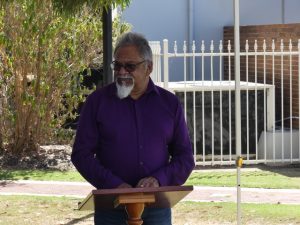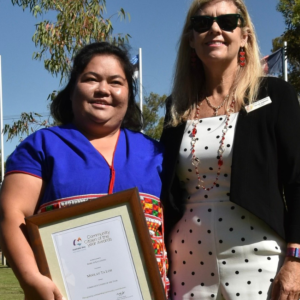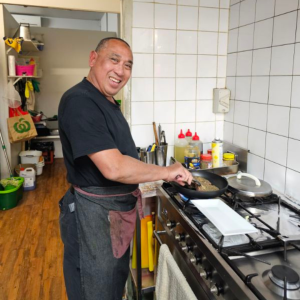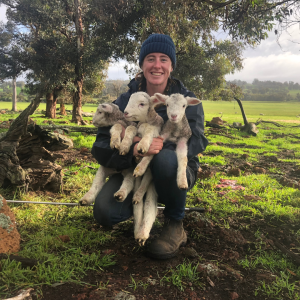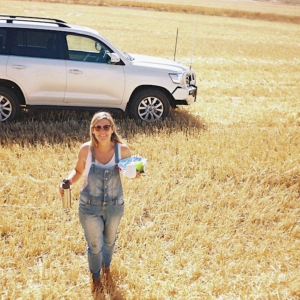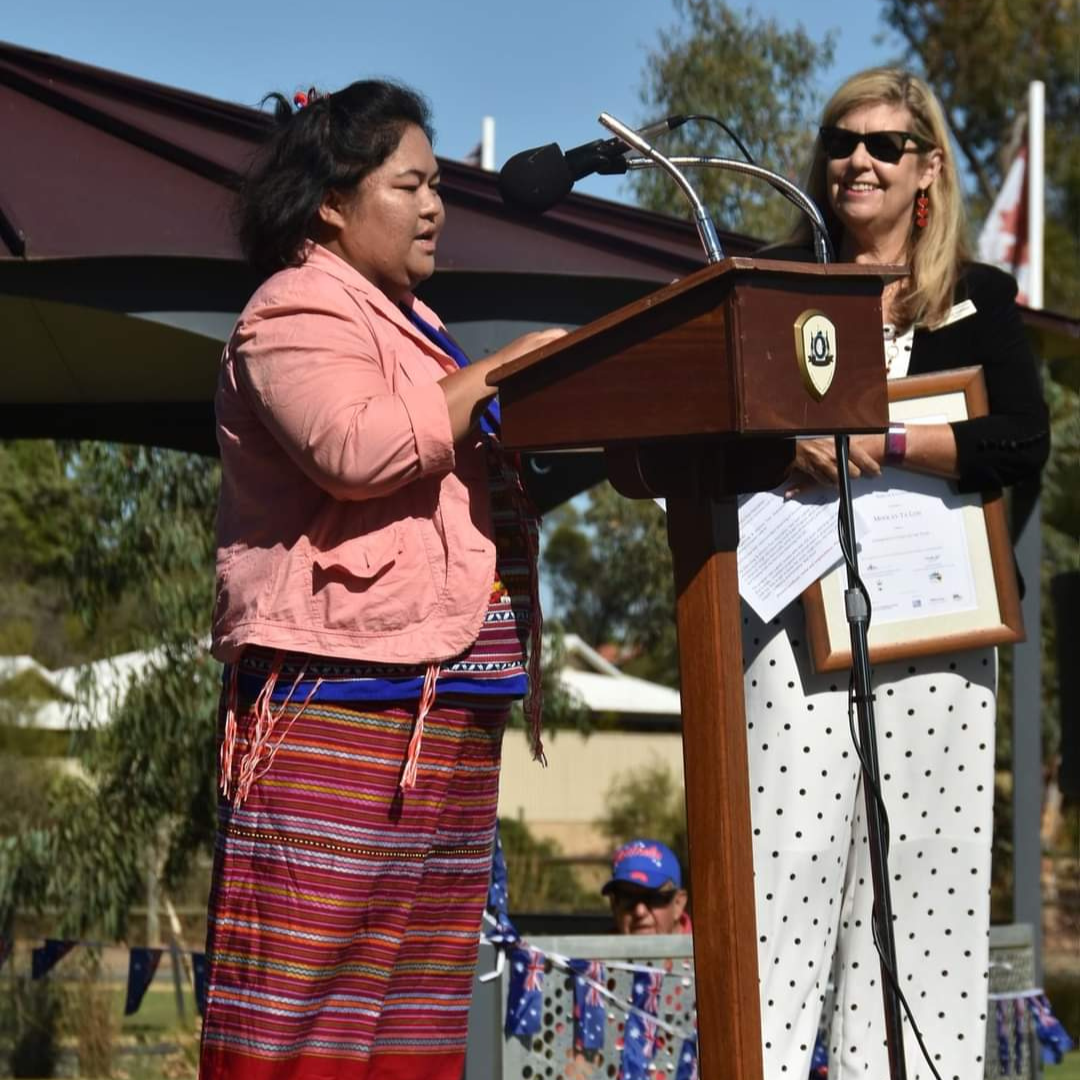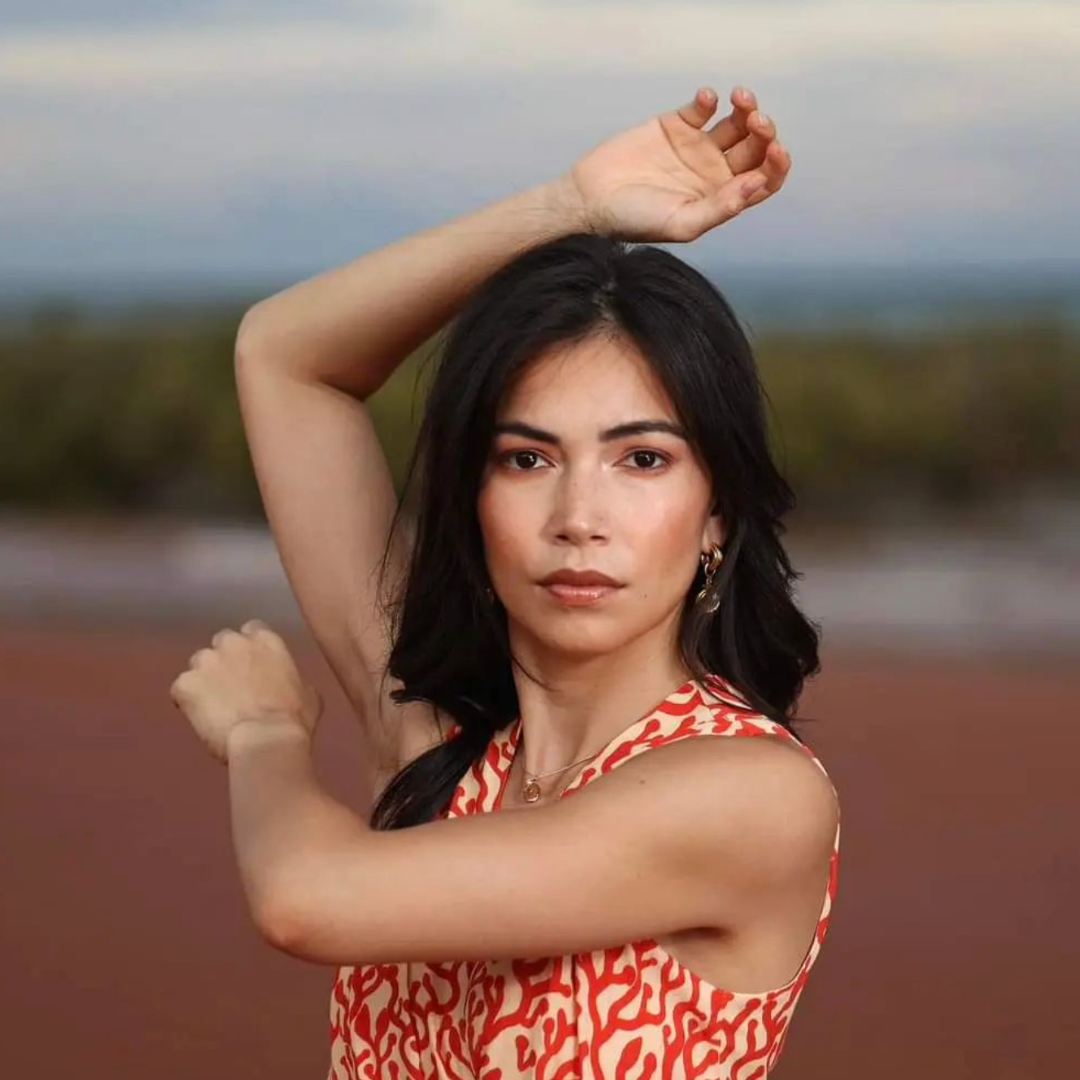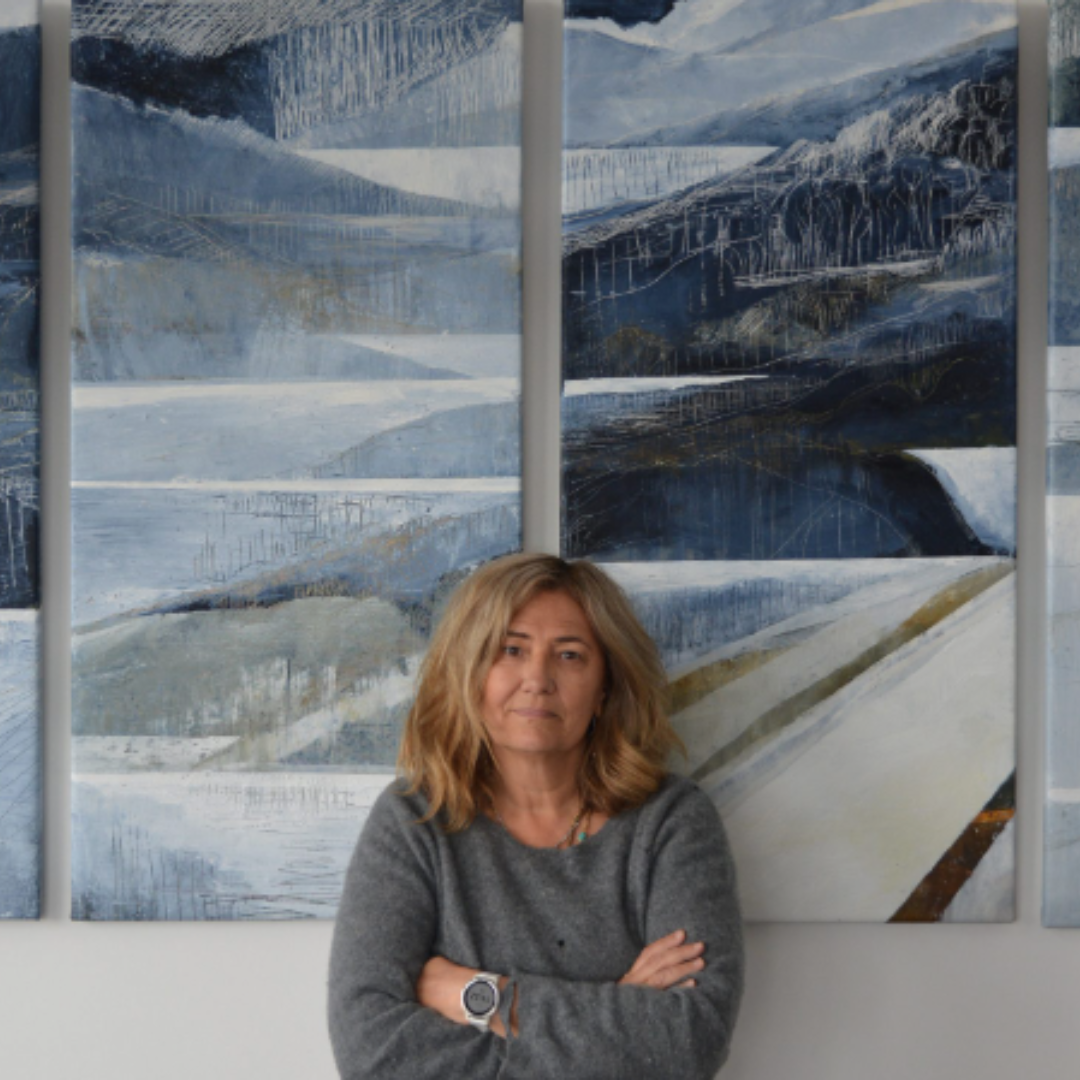[00:00]
Naive O’Brien you moved where
[00:02]
I moved from Perth to Kittanning with a few stops in between
[00:06]
so tell me about Kittanning that stumbled into your life. When you met your your partner Caleb. What was
[00:13]
your first impression of cattani? My first impression was actually not very good. When we first moved to Kittanning we were living in a house in town and I wasn’t working yet and Caleb had a job. So I was home during the day and a lot of the people who walked around a house in the middle of the day and the middle of the week. We’re not all that friendly looking and I told Caleb this I said where if you moved us to and he said, oh no all the friendly people work during the day so that that impression of Kittanning you could get in any Country Town anywhere in the world. I would say and it very quickly turned around to be a very very good impression of
[00:54]
returning.
[00:55]
And I think your experience is very interesting because you you’re young. How old are you?
[01:00]
I’m 26, you’ve had
[01:03]
no prior experience of living regionally or anything like that. So what was the pool for you in terms of how did you end up arriving in Kittanning?
[01:13]
I ended up in containing specifically because Caleb went to high school here and he always wanted to move back here.
[01:20]
I have just never felt fully happy in the city. I think or I didn’t I probably didn’t even know that I wasn’t fully happy in the city until I moved to the country and went okay. This is where I’m supposed to be. Yeah, it’s it just suits me and my my head and my life so much better than living in the city ever would tell he’s like such an agricultural
[01:42]
Hub sort of where it’s based because he hadn’t lived in the regions obviously had no Outback skill set sort of prior to moving here. What was that like coming into a place where everyone’s highly Specialized or most people highly specialized in sort of Ag and Farm Life. What was your level of skill? And how did you adapt? Yeah,
[02:04]
my level of skill was absolutely absolutely tragic that I remember like starting at the farm that I started working at with Caleb everybody knowing all the things that country people know that I just
[02:20]
Had to learn from scratch like doing up ratchet straps or you know how to properly load the back of a trailer or how to drive a quad bike. All of these things that country kids just seem
[02:32]
to be born knowing and I believe that you got some tips from a two-year-old. Is that right?
[02:37]
Yeah. There was a two I learned to do a ratchet strap up in my first couple of weeks of working on the first farm that I worked on and then two weeks later. I was at a Servo and this two year old was doing up to strip on the back of his dad’s suit. Wow. These kids really are just born with those skills. And
[02:55]
you’ve got a young family now yourself. There’s a myth sometimes that the regions can be hard when you’re young family, but because it’s tricky to find a social scene or like child care and things like that, but what’s Experience been like for you in terms of social life and having having a baby?
[03:13]
Yeah. I haven’t found that at all in Kittanning. There are so many people my age and 10 years other side of us.
[03:20]
Think Tenney and there’s yeah, I think there’s also a myth that kids grow up in the country and then they leave and it’s just their parents left behind and they go off to the city and chase their dreams in the city and don’t ever want to come back. But so many people have grown up here in Kittanning and stay here and have no plans to leave. It’s a great place to live having a young family. There’s it’s been awesome because there’s always someone around to help and like I was just at netball training last night and I brought the baby with me and there was like four people as soon as I walked in saying give me that baby. Give me that go and run.
[03:57]
Records, it’s not not been a hurdle for me at all.
[04:01]
In these days and we started talking about like the great things that new people coming into an area can bring with them and I suppose youth is really important as well. Why do you think it’s important to have young people and that kind of vibrant culture of Youth within a town
[04:19]
containing does a Harmony Festival in March and it’s all young people who cook food and the young people’s new businesses is Gypsy kitchen and her new business. She’s my age coffee cups and things that that kind of culture of the town. I don’t think would exist if it was just older Generations.
[04:38]
Yeah, the Multicultural element of Kittanning is fascinating. Is it a really enjoyable kind of Hub to be a part of when you’re surrounded by lots of different people from incredible enriching cultures?
[04:49]
Yeah. Definitely definitely is
[04:51]
what do you love about your life outside the city.
[04:54]
I love that. I can look at my window now and there’s not a single house inside.
[05:01]
I love that I can walk around my whole house outside naked if I want to and nobody can see I love that.
[05:10]
Stars are brighter and the skies bigger and and yeah, that might life feels like
[05:15]
it has more opportunities here than it did in the city. So speaking of outside perspective. What do you feel being an outsider that you’ve been able to bring to the town and sort of bring to the community or to your experience of the community?
[05:32]
Country people and
[05:33]
agriculture in general are at risk sometimes of just doing things the way that everybody else has always done it because Farms have passed down from father to son and father to son and it’s things just happen the same way over and over again.
[05:50]
It’s gotten a lot better now and people like me coming from outside has helped that in a big way of doing things more from a scientific background and actually doing things for reasons and I found that when working for people because I have to learn everything so actively I ask so many questions asking someone to explain the reason why they do something is a really good good way to help them justify why they actually are doing something the way that they’re doing it and it means that quite often I can see a better way of doing it because they haven’t really thought about it maybe
[06:24]
And I also I think from an occupational health and safety point of view. I probably balk at things a little bit more than someone who’s grown up on a farm might like I remember the first time I was asked to climb up to the top of a silo.
[06:40]
I was terrified and and that’s something that nobody might think of if they had grown up on a farm and done at 100 times and it might not necessarily be unsafe but it’s it’s definitely something that makes you it makes you think about it a little bit harder than a farm kid probably would for sure.
[06:57]
Do you see yourself staying in the community long term and what does your life there look like I guess from here. Yeah
[07:06]
100% I say myself staying here long term my partner and I lease a little farm just to the east of us and I hope we continue listening that for a long time or leasing land for a long time. We have a really great group of friends. We’ve got our three months old little baby and we’ll be raising her in Kittanning for sure and hoping to have more kids and raise all them in Kittanning. I yeah, I don’t see myself moving from here.
[07:29]
At all, I’m really at home here.
[07:36]
So Liz Can you please describe what it’s like to drive into the town of Kittanning.
[07:41]
When you drive into Kittanning you go through vast agricultural land and then when you come into coming down from the north on the Great Southern Highway you go past wamco, which is commonly known as the meat works and has been for over 50 years. And then when you drive into our big roundabout bit further along into there’s a big roundabout or on the right, there’s an all ages playground and this playground has been refurbished. It came from the inspiration of community and Council back in the very early 80s and we’re talking huge slides. We’re talking huge risks and huge fun. And we’ve refurbished it just in the last few years and it’s a place that is really important for our community but also for
[08:36]
Our neighbors in surrounding towns and then I continually hear stories about people who they’ve been stopping in Kittanning to go to that playground for 40 years on their way to Bremer Bay or on their way to somewhere else and now they’re bringing their kids back and doing the same thing that they did many many years ago. I am absolutely one of those people so I grew
[09:00]
up playing on those slides that big wizzy thing that goes around and around it is terrifying now as a parent the slide are so high they’re like, how high is it
[09:13]
describes some of how big this slide’s are tall. There’s certainly over six metres tall. They’re very long. We actually call that the spinning Circle of Death and even we had some medical students staying down here just recently in them to the park and it’s just great how you see people, you know, are they obviously climb into this satellite dish I think
[09:36]
He’s the proper term for it and they all around the outside, but then you’ve got half a dozen people who are actually grouping on the outside and people moving it around so that they are all flinging around as well. Not for parents huge fund for everybody else.
[09:54]
There are over 4,000 people in the Shire of Kittanning. So what have you noticed about the population over the years that you’ve been
[10:00]
there?
[10:01]
It’s interesting because we are very well known as a multicultural community and have been probably the real Catalyst for that was the copas Malay people that came here in the early seventies. But if you actually think about Kittanning it’s always been a place of people coming from other countries containing is the Aboriginal name is cut knitting some people call it cat Nene and that is non as the head or it’s generally known all those different versions is known as the meeting place. That’s what the the area is called.
[10:43]
Many of the original farming families were German they came via South Australia and then to Kittanning and then in the 60s many Italians and a lot of those families they had multi-generations in their homes. So it was very normal that Nana and Nano were at home many couldn’t speak much English and you know, we talked about the food of Kittanning and we talked about how important that is and how identifying it is. And I think we see that particularly with the caucus Malay and that Malay food.
[11:20]
What is some of the other incredible things that you’ve learned through the different populations of people that live within the town
[11:29]
Different groups have come through our community in different ways. You know, we still have as I said many of our Italian families, we’ve still got a lot stronger Italian Community here. There’s still a strong Focus Malay Community here. We now have a crane Community here not I don’t know whether we’re a very religious town but we do have 17 churches including a mosque. So everyone’s catered For if you have no matter what denomination what we see is different aspects of their culture. For instance last year. We had a very strong Vanuatu and Community who were working at the at wamco and they did some dancing here was the first time that they’d done it and just this incredible energy and music that they brought to Our Town Square for everyone to enjoy interestingly some of the key real moments that have been transformational probably for our community is
[12:29]
at that Harmony Festival which showcases all of our community all of our Multicultural community that shows the many different cultural groups that we have how much we really value and respect their Traditions their cultures. We really want to soak that up and I think there’s a real future in being able to bridge The Divide between language.
[12:56]
So is it fair to say that work is one of the reasons that people would move to the region?
[13:02]
Yes. Absolutely. I think the Catalyst for this movement and sort of the moving into town is very much that opportunity to take up secure employment. I mean that’s that’s a key factor. There’s no doubt about it. The last group of people the last decade the Corrine people of the you’ve got yet secure employment. Then you have a welcoming Community. We are a community that is very out and proud that we have people from all corners of the earth. Everybody’s dream is to own your own house and certainly, you know, nearly 50 different families Karen families now own their own house in Kittanning.
[13:52]
Is it festivals like Harmony Festival that you talked about before and events in the town that start to make the different rituals and traditions apparent to the community?
[14:05]
I think very much so as much as our Harmony Festival was probably groundbreaking it’s it’s something that has been going on here for more than 20 years in various iterations beginning as the Multicultural Festival. We probably started as a real local festival and then it grew and there’s no doubt. The harmony Festival has grown and is very much a Showcase of how Community works really well with many different cultures and how that old thinking of division which was very much a case and I don’t see that now and I think the fact that we were all different and we’re all from somewhere else.
[14:52]
I think there’s more understanding of that and understanding of world news and the challenges that many people face in their own country and why they want to come to a place like cattani Australia and then Kittanning, you know for their safety and to be in an environment where their family can thrive.
[15:15]
Our current art exhibition at the moment in our art gallery is sort of memory boxes and it look at was tied into the harmony festival and the timing that I’ve just been through it and it is so incredibly powerful a fantastic way of demonstrating not only culture but history of different families. There is a Korean group. There’s a Filipino. There’s Italian there’s some textiles from India there’s costumes from
[15:51]
Burma it’s really quite an amazing exhibition. And I think things like that something that we really thrive on and that we work really hard to ensure that there’s inclusivity.
[16:11]
So that sort of shows that people are interested people are not only interested in just seeing something nice but interesting in learning about who’s in our community because it was very much about who is in our community. So I think that is something that we now businesses usual for us is to be inclusive to Value people’s culture wherever they’re from
[16:37]
it’s just how we roll.
[16:40]
Can you talk to us about specifically some people from migrant communities that have made an incredible impact on the community?
[16:48]
The first person that you think of is probably Alec Marty when we talk about that and Alec is our local Imam. He runs The Daily Grind Cafe. He’s our Super Media staff from back roads and a number of those programs and he has he’s just blossomed really in the last decade in telling his
[17:10]
story and showcasing Kittanning for that genuine acceptance of different cultures.
[17:18]
And we’ve had you know many people who who are amazing in this town and I think some of the quiet Achievers, I mean the fact that moulay Tha last year was giving the citizen of the Year award. I was very proud to be able to give that to her. I have not seen anybody who has had as many nominations as mulai. That’s that’s pretty incredible. You can see that
[17:53]
what she’s doing is just really
[17:56]
just quiet accomplishment within her community and Bridging the Gap between understanding of what’s available for.
[18:10]
Young families helping them and that’s that’s really powerful work.
[18:17]
Alec Mighty you moved where
[18:21]
from Christmas Island to attending
[18:23]
I’ll let you were 14 when you left your life in Christmas Island because your parents decided to move to Kittanning for work. What was your life like on Christmas Island?
[18:33]
I can recall. It’s it’s like an island surrounded with the sea you just isolated from everything.
[18:44]
You know, it’s just the land and the Sea this within the compound of the island that you know that we you wander around.
[18:53]
So tiny
[18:53]
Island life and being surrounded by the ocean. That’s quite the adjustment moving to Kittanning the wheat belt kind of area. What was it like a Justin to Kittanning as a teenager back in the day?
[19:07]
It took a lot of adjustment from you know, wondering going about your day daily life on the island and swimming fishing snorkeling and then coming to a remote Tiny Town of kutani is surrounded with vast area of land crops bushes trees and sheep and cattle it’s hard to imagine how the hell I can’t even Mama and Dad it’s hard to describe but so unique to least behind a life of a of an island boy and the sea is our playground from here to the next town like Albany. Oh it’s about at least two three hours go to and that’s what it is.
[19:58]
I’m from the nearby town of coaching up sort of broomhill side. So I always grown up sort of having Kittanning as a place to go and over the years. It’s definitely changed, you know, the town the main drag has sort of become a little bit more hustle and bustle as it used to be I believe and you actually have an important little piece of real estate on the main drag you own The Daily Grind a cafe, which I absolutely love like many people in the town. What inspired you to open a cafe in Kittanning.
[20:29]
Tell the truth. I’m all I’ve always dreamed to own a coffee shop like watching the got father or any movies like all the sit down in a coffee shop and written his favorite drink coffee. I remember many years ago, maybe 20 30 years ago. I used to have two restaurants actually one in Bunbury one in Kittanning that then it was not violent enough to survive because
[20:58]
Lack of population but one day and I was watching I think it was a it was a caboodle day Christmas caboodle and I was watching this this shop called The Daily Grind 10 years ago in I said to my I wish that I if I have enough money and I’ll buy that business and never looked back. It was a challenge for me, but my dream came through
[21:25]
and there’s so many people in the community that really love to to go to your business. You’ve done such an incredible job at creating a space that people love and of course can get a delicious coffee from you such an invested Community member you were a shy councilor your local Imam your business owner. What does contributing to community mean for you?
[21:48]
Well, a lot of people have inspired me. I want to be part of pretending. I am working for someone at the local.
[21:58]
Wasteful for about 22 years in our communicate with people and I know I learned through my experience as a Salesman and gradually I started in love with with business and I I want to contribute something back to kutani. I’m so lucky to go all my children have grown up and have left me and I I don’t have any dependent at all. You know, that’s fine. It’s inspiration that other people that I’ve seen or encountered I said, I wish I can do as well as them but never never knew that I can I have the experience. I’m so lucky that you know people acknowledge my contributions.
[22:44]
Through contending itself, you know 15 years that shy counselor as the Shire counselor in ambassador to abattoir many other things that I’ve done. I don’t look at what I have achieved but I I always focusing how am I going to survive in this business as an owner of a daily drive? It’s not easy, right? Oh, it has got a lot of challenges
[23:09]
Kittanning is definitely very lucky to have someone like you who’s contributed so much. It’s a very Multicultural Community with so many Rich cultures influencing the region and the community. What is some of the things that you’ve shared with Kittanning in regard to helping them understand your culture?
[23:29]
From the beginning and that was my first factor of business in by opening that the business and show what we have done here and what I can give back to the community and such that business have a track as a product of contributing our culture our values but people seeing us but people come and see me and say hello in the data it became my office people need to come to see all of us. Haven’t you have you he has became a foundation of communication in Army for all the people that come out that curious that sold me on YouTube told me on Facebook so many on ABC with had a Hewitt and as far as Queensland even even Marcus ring me and I asked interview to recall all that.
[24:29]
Just you know phenomenon not I surprising that people, you know have given me that support. Otherwise, I’ve gone down very quickly. I have we have a chief 10 years of my business but by myself without any one helping me without my children helping me know family members are I because I don’t want my family even my own wife to be part of the business and I don’t want them to suffer if I fail it’s a business fail. It’ll be my failing but so far touch wood. He has not been easy for me, but I’m grateful
[25:11]
you mentioned the caboodle early, which I clearly remember as a young girl. My grandma took me and my brother’s and we would save up our pocket money and we just thought it was the most exciting thing to ever happen to us jumping on the Bounty castles and enjoying all of the things.
[25:29]
Community events are just such a big part of regional towns. What are some of the events that you’re involved in that highlight the Malay culture.
[25:38]
We have introduced not introduced what we have participate in showing our dramas. The island is dramas. So many things that we have contributed and then showing off our food stall we have contributed in supporting the Christmas night a day or two before Christmas happened, you know food stall and few other things that has been organized by the community intending there’s so many things like this little is one of a young girl memory that we were remember it’s been great for us. It’s still great for kids and
[26:16]
Season of the podcast we talk about when people move into a Regional Community they bring some wonderful new ideas and perspectives and they, you know are able to embed so much more Rich understanding and new ideas. One of the things that we’ve been talking about in this season is the wonderful ideas and perspectives and the new fresh things that can be put into a community when you bring lots of different people from outside in I thought it was fascinating that the Malay Muslim population of cattani built a mosque, which has been loved and revered over the years. I think that’s a great example of something brilliant that was brought into the community billed in the community. What was your experience of the mosque that was built there by the main Muslim Community.
[27:12]
I remember writing as you know in the first
[27:16]
Islander Elders arrived in 71 focusing what will be our future and we arrived in 74 and I was a young young teenager and then gradually building myself as a young youth leader gradually involved in fundraising for the future of building a mosque. I can remember for so many years. We renting or leasing buildings such as the old as you know, they were many years ago. The old rectangle used to be in old building their way to trade they all get together. They and then we had RSL Hall that we hired for many many years due to perform our prayer and Gathering and good burned down and then and then we finally found a space and just out of 10 not very fast.
[28:16]
It was it was still a winery. I can remember and at night during man of Ramadan. We all gathered it for 30 days or 30 nights mom and dad and and the community used to bring our own territory. If you remember the Kara he says and then it was cold in the back in the winter. And and there was so many pigeon running flying around while we’re praying that moment of challenge for us and our family and that we we save a lot of money without any help and then I will remember at the age of 17 years old the youngest Secretary of the mosque. We approach in the government and that day and then bought a purchase a land that we the most now it was a challenge for us, but building that mosque. It has become an icon not just for the local but people from overseas including the former king of Malaysia who came here.
[29:16]
Ice with with his family so many dignitaries have been here. And then that was officially opened by the former first prime minister of Malaysia took up the romance in a lot of people seemed maybe think. Oh it is it is a little symbol but it is a symbol of unity it is to me personally. It is a simple of participation. It is a symbol of appreciation a symbol of tolerance to show that to others like in particularly the Malaysians and in the South East South East Asian countries, how do we all survive here? This is the secret. This is the question a lot of Malaysian Malaysia speaking like us I wanted to know we have created a lot of things, you know, we didn’t get any tourists from Malaysia from South East Asia this in our face with this in our YouTube Why YouTube those that was produced
[30:16]
By the Singaporean tourism company, it’s been viewed by over 1.5 million and they are coming to be turning to see how we how do we all survive this world is big enough for everybody to leave. We must like our role a positive role in the community that we live in that’s what it is.
[30:42]
What are the things that
[30:43]
You love about Regional life away from the city.
[30:46]
It’s just the people it is the quietness. I always think about the people that I looked after, you know, and I was always said and I can be built a Taj Mahal in men’s room in Somewhere Else. But continuing will always be my little cottage home. I can talk to friends. I can talk to you and talk to anybody that comes to the shop. This swimming is home as it to my children. How is a shelter but a home where I can talk my friends talk about Foodies talk about anything that I would like to talk about in the morning drinking coffee. He took about issues and related to fishing or 40, whatever maybe this friendship alive created fast 50 years.
[31:56]
For 11 years when we live in Thai border. I never dreamed like I have to be moved to Third Country. But this time we have opportunity where the people live in the refugee camp. They have opportunity to like ACL.
[32:17]
if like when the people live in Thai border refugee camp
[32:21]
We have an ID for Refugee idea great opportunity for other countries to come in the refugee camp. Like if you would try America Australia, New Zealand Canada. Anyway, like a wish one you want to try so you apply them and then for me I chose to offer because my Army come first in Australia, so that’s why I’m really happy to you know, like get opportunity to a camera to live with my auntie in Australia. That’s why I chose to Australia when we arrived in the so amazing for me. I just going to like get a job in the restaurant Thai restaurant in the evening for the pocket money.
[33:21]
Yeah, that’s great for me to improve my English. I really happy.
[33:26]
to live with my Auntie Uncle in Melba
[33:30]
Twice we are four nights. You have to apply for 50 or 20 job. My husband nor the friend in the content. They talked to their and then first time my husband said, yeah, I was going to move to 10 because I never know like I would stay in containing, you know, I will move to attending.
[33:53]
And then we decided to wait my husband. That’s why we got all the first kiss like a mom when we move in the Telly and my husband come first and then they call outcome later is always find that easy to lift in the Telly is quiet place. And then also my husband love to what in the Avatar in 2012 we moved in Kittanning when the first move took a tiny, you know, I feel very lonely because that’s time is because I have much like a
[34:33]
Korean Community not bigger enough. So that’s why I didn’t know anybody how to go that but that tongue is I feel like a more happy a little bit. You know, like I’m not feeling lonely anymore. I got some author my friend is here for my husband nor the friend here. We’re talking each other and they still living more confident in here.
[35:01]
And the house prize is you know, like not too expensive. So there’s one is pray for our family. So that’s one which was to live in any when we going to the mother group. Not only Karen mother group. We connect with other mother also like that other other improve so we know each other so we feel like a very
[35:31]
collect a communicate with each other to be stronger and then the kid love, you know, like a two playing each other and they know how to like
[35:44]
Sharing the start with other kids and how to communicate with other other improve acne proof like other kids or so. Yeah, really happy. I get a job. I really like the Happy
[36:03]
to get the job and then I really happy with the walking with our current community. So I have like other mother.
[36:16]
no, speak English we go with them with talk with her and they were communication and then we have also doing like a translation or
[36:28]
That’s great. We communication is other so that’s why we are not exactly like.
[36:35]
How we configured as we connect each other? Yeah, when I stopped working with the Community Connector in my room in the Community Connector one is I do like a many thing working with a young mother.
[36:51]
And the kids happy with the children and then setting settlement what and you arriving? He he intending.
[37:01]
And then also I just attended meeting on behalf of my community and the passing of the information.
[37:12]
I got yeah, I know where we try to get the going to the plane through which other mother we talked and we sharing like a culture sometimes, you know, we learning.
[37:27]
New skill, you know like other countries, so that’s why we know is other is a different culture. Yeah, we sharing the food other culture.
[37:37]
And then some of the mother brings her father their own food to share with other.
[37:44]
a lot of mother like they know like a lot of different fruits that we
[37:50]
we share, you know, like with other mothers. So yeah for me on my traditional food one is the first one like a soap like a taco one other one is we make with the rice one is pack upon. We do like a special day like a New Year’s and then like a Thang giving all we could kill that for we never forgot our
[38:17]
own food and our own culture for so that’s why we always
[38:22]
hooking that we try to other culture food also in learning each other and no other culture and more other.
[38:33]
Other food different procession we know each other more than like we share the food different type of food. So that’s why never forgot what our own foot or so. Yeah. My children growing up in return is I feel like a quiet place and
[38:54]
Face or the children and closed for Community when our like a small kid little kid live in town one is most better than going to the city. You know, I resist the citizen or is I feel like a very proud of my cervical in my life and never down for that award. And also I think all people when the nominated me to get this it is your loss really give me like best memory never forgotten, you know when I start walking with the current community
[39:42]
Start working with the connector beginning one. I think most of us likely the people like see my walking and my job that I doing before that.
[39:56]
Volunteers in my country. So yeah, and a lot of people they are running nominate to me to get this over. Yeah, some of the mother is the they have non-english. So that’s why it’s harder than when they’re going to the GP or
[40:15]
like a child immunization one and one of the
[40:22]
working with a mother. I just going to the mother group and doing now we started teaching like a traditional weaving, you know in for the weaving one is or we tried to do like
[40:38]
doing the traditional weaving one is like mostly the mother came to that country one is
[40:48]
they know how to weave in their own traditional clothes and there are so we do like a, you know, like children attached to Prince school on Saturday one.
[41:02]
to maintain their own language and culture
